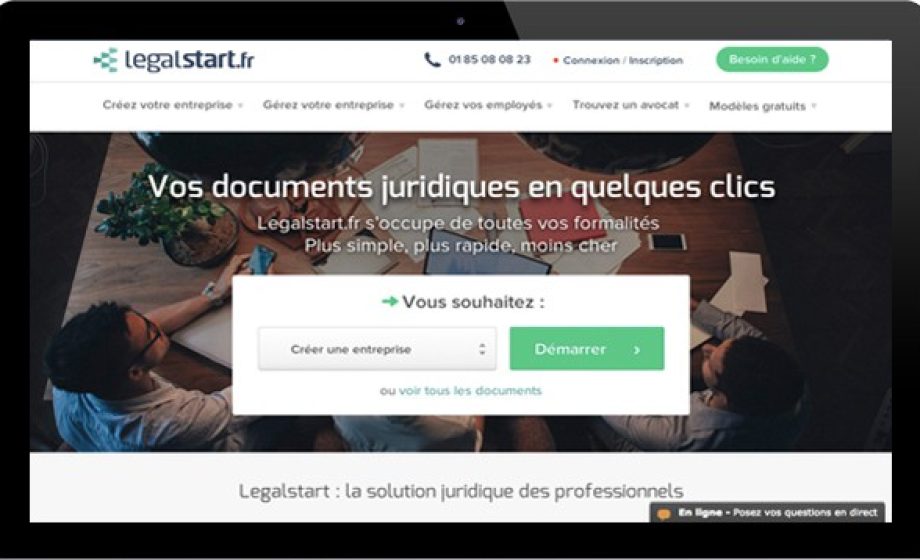
Anyone who’s launched and operated a business in France knows how challenging the required legal and administrative procedures can be (91% of french managers and entrepreneurs believe there are too many legal and administrative requirements). Of course France is not unique in this regard and the French administration has made various efforts in recent years to reduce the administrative headache for startups and other SMEs. However, companies, and particularly small businesses, still spend too much of their time navigating legal and administrative issues and waste too much money paying others (namely, lawyers and accountants) to do so on their behalf. Enter Legalstart.
Although not the first, a rapid rise to #1
As soon as an entrepreneur moves to set up his or her business, the legal and administrative requirements begin. In recent years, technology has made this process easier with a myriad of sites (e.g. iStatut, statusonline, Clic Formalities, etc) enabling you to both create all the necessary paperwork and submit them directly with the authorities. However, while many of these sites were a big leap forward in streamlining the process, their solutions can often either be ‘buggy’ or inflexible.
Using a dynamic questionnaire-based approach, that’s quick – can be completed in 10 minutes or less, inexpensive – 149 euros end-to-end vs approximately 1500 euros via an expert such as a lawyer, and, being all on-line, highly efficient – 48 hours to set-up the company, Legalstart has significantly minimized the pain for many new entrepreneurs.
 Founded in 2013 by Timothée Rambaud, Pierre Aidan, and Stéphane Le Viet, Legalstart aims not only to offer entrepreneurs a more adaptable platform for the company creation phase, but also go further and address the ongoing legal and administrative challenges and requirements that confront startups and SMEs everyday. Legalstart has already risen to #1 in its sector, having helped more than 8k entrepreneurs establish and administer their businesses. So, this means not just bylaws and company registration, but also things like registering trademarks and managing requirements to adhere to the often complicated employment law.
Founded in 2013 by Timothée Rambaud, Pierre Aidan, and Stéphane Le Viet, Legalstart aims not only to offer entrepreneurs a more adaptable platform for the company creation phase, but also go further and address the ongoing legal and administrative challenges and requirements that confront startups and SMEs everyday. Legalstart has already risen to #1 in its sector, having helped more than 8k entrepreneurs establish and administer their businesses. So, this means not just bylaws and company registration, but also things like registering trademarks and managing requirements to adhere to the often complicated employment law.
Allocating the right resource for the right task
According to Rambaud, they’re ultimate objective is to “allocate the right level of resources for the right task by leveraging technology and automation.” This is particularly true for most administrative procedures, which the Legalstart team believes are straightforward enough to be automated. However, they don’t feel they will ever be able to completely replace the legal expert as there are inevitably legal and administrative issues that arise which require a more in-depth, complex approach. As a result they also provide the ability via their platform to connect with legal experts, who are rated by the community, making a kind of “TripAdvisor for legal services.”
The team hopes to extend the impact they’ve had for their users much more broadly. As such, they’re currently working with the French Prime Minister’s cabinet to offer suggestions on the government’s ongoing enterprise administrative simplification effort. Not an easy effort of course, but they strongly believe their process of automating various administrative procedures for startups and PMEs, well positions them to offer insights on which areas of the process can be streamlined.
Scaling beyond France?
As laws can differ substantially from one country to the next (and in the case of a country like the US, one state to the next), scaling a business such as this to new markets can be quite challenging. In order to develop the solution for France, they needed to work closely with experts to determine how and where they could automate the process. Imagine doing this for every country. Of course, in theory the process is largely similar, but the challenging part can be in the details, as this is where even small errors can result in costly outcomes. In addition, to ensure that they would be able to gain the trust of entrepreneurs, securing recommendations and accreditations from various legal and government entities was a key step for them in establishing credibility with users. This approach would need to be replicated in any market that they enter.
Therefore, the team is carefully evaluating where to expand next. The US is already fairly advanced in terms of these types of solutions, such as MyCorporation and Incorporate.com, so they estimate the US market would extremely difficult to crack. However, Europe (particularly Germany and Nordic countries), potentially offers a more interesting opportunity for them, particularly due to the big uptick in entrepreneurial activity across the continent and the fact that when European companies expand, they tend to look to their neighbors first. Another set of markets they’re also considering are other French-speaking markets, where the legal system may be more similar to France’s. At last count, 1000 new documents are being generated per month on their platform and, since their founding, they’ve helped generate 15 million euros in savings for entrepreneurs. This alone should give them a compelling argument as they look to expand their user-base beyond France.
However, according to Rambaud, their first priority is to further scale in France by identifying areas of the French administrative and legal process that are ripe for automation, rolling these out to users, and, of course, bringing significant numbers of new users on-board.
Legalstart aims to eliminate the legal and admin pain for SMEs

Legal
